1. Overview the project
Rice plays an important role in the food system. Improving the rice value chain, particularly in developing countries, would contribute to the resilience of sustainable food systems. In many African countries, rice is the main food crop, but these countries in general suffer from large deficits in production and processing technologies.
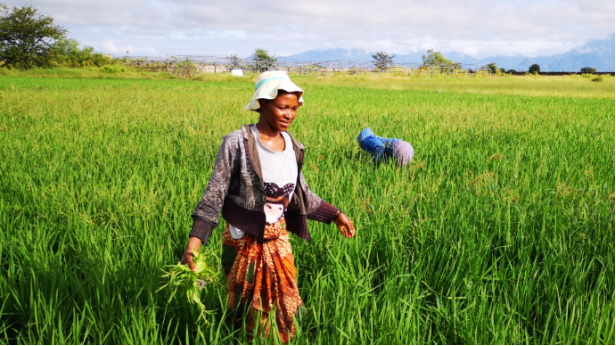
As the third largest rice producing country in West Africa, Côte d'Ivoire has made some progress in rice production. Not with standing, Côte d'Ivoire still relies heavily on imports to satisfy its growing domestic consumption. National rice production is below 50 percent of its demand over the last three decades and facing more challenges on post-harvest loss management.
To address the situation, in March 2021, WFP Centre of Excellence for Rural Transformation (WFP China COE) and WFP Regional Centre of Excellence against Hunger and Malnutrition (CERFAM) jointly launched the China Africa Rice Value Chain Development Project. This project is under the Global South-South Development Centre project, which was jointly initiated by United Nations Office for South-South Cooperation (UNOSSC) and China International Center for Economic and Technical Exchange (CICETE), aiming to facilitate South-South knowledge sharing, mutual-learning, as well as technology and expertise transfer on post-harvest loss management to enhance rice value chain though South-South Cooperation (SSC).
2. Approaches and Methodology
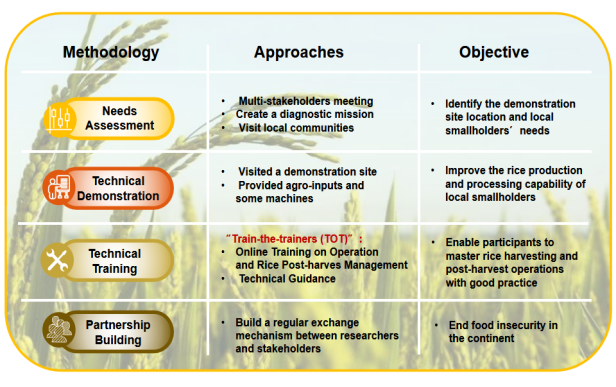
● Needs Assessment
Missions were taken to understand and analyse the local demands.
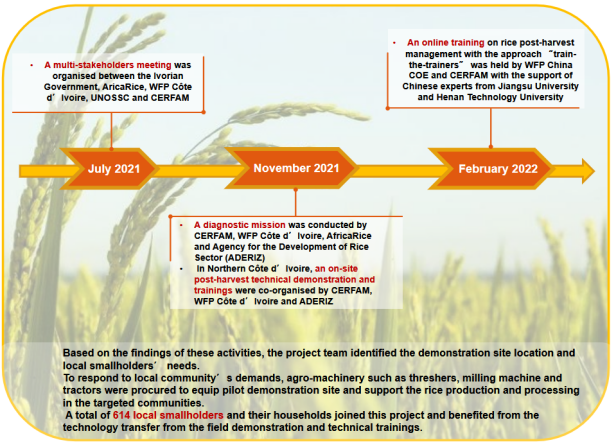
● Technical Demonstration
Prior to the field demonstration, missions were conducted to map the rice value chain in Côte d’lvoire and better understand the need of targeted groups.
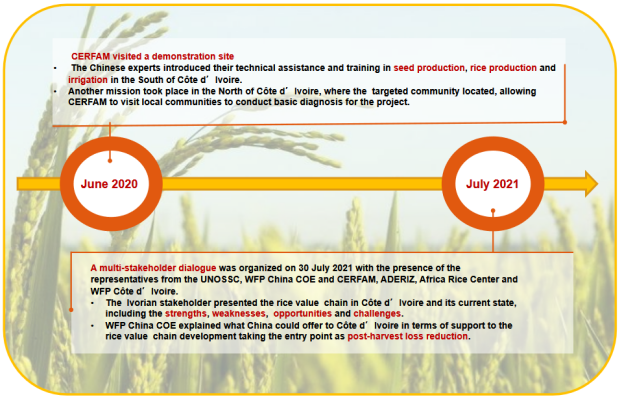
A demonstration site was established in the local community, named as Korhogo. Smallholder producers in Maramana, Kantara, Pitiangomon and Nankaha, could witness and learn from the field demonstration. The demonstration site could also provide the venue and equipment for short-term trainings to local smallholders who would like to learn rice production and processing techniques.
● Technical Training
Two technical trainings on rice processing with the approach ”train-the-trainers (TOT)”was organized. The TOT model targets the know-how transfers of affordable and applicable technologies to local partners, and further disseminated to smallholders.
● Technical Guidance
A set of technical guidance, including 9 volumes (5 in English and 4 in French) on Rice Post-harvest Loss Management was developed, based on the presentations and lectures delivered by Chinese experts during the online technical training. The technical guidance is themed by Use of Tractor, Rice Threshing, and Rice Drying Technology etc.
● Partnership Building
A China-Africa Rice Value Chain Development Synergy is formed to build a regular exchange mechanism between researchers and stakeholders in China and Africa to enhance the partnership on rice value chain.
This rice value chain development synergy aims to:
• Share rice-related organisational engagements in China and Africa
• Exchange on experiences and lessons learned in rice value chain development
• Identify opportunities in Sino-African collaboration on rice value chain
development at technical and policy levels
• Forge partnership between China and African countries in knowledge exchange and capacity strengthening
3. Beneficiary description
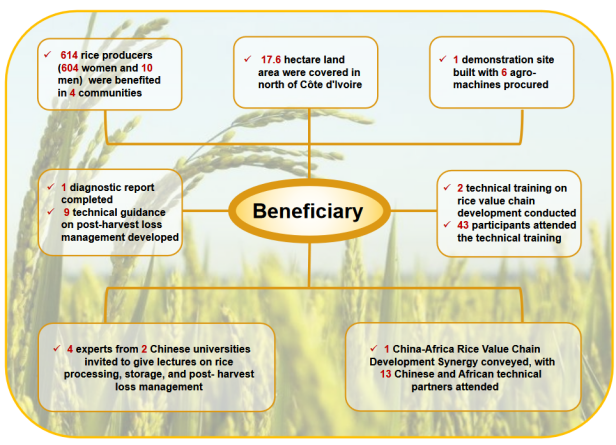
4. Reference and recommendation for other country:
• Field-level engagement
For agriculture demonstration project, field engagement is important. If travel restriction still poses a big constraint, virtual study tour could provide know-how transfer with abundance of visual information as an alternative of field instruction. Experts can demonstrate appropriate operation of agro-machineries and processing techniques in videos.
To better coordinate with the Chinese experts based in Côte d'Ivoire, it is recommended to engage them to the next phase of project for both design and implementation.
As the latest endeavours of WFP China COE, WFP-China South-South Cooperation Knowledge Sharing Platform and Cloud school could provide in-depth, comprehensive and continuous courses on knowledge of value chain development, including the rice sector.
• Further support to local producers on rice production and processing
The local communities face challenges in the preparation of rice production, including access to inputs, land preparation, seeding system and water management. As reflected by the low productivity per hectare in the target communities, it is recommended to provide further support for both production and processing, storage, and packaging, which could contribute to higher production with better post-harvest management.
• Gender equality
For this project, women farmers are greatly involved in the implementation, with 97% of the beneficiaries are women, that is 604 out of 614 beneficiaries are women farmers. For the future implementation, women farmer groups could be further empowered through technology transfer and capacity building.
• Sustain the impact of first phase implementation
The project helped local farmers increase their output and reduce loss in northern Côte d'Ivoire. The demonstration and trainings could be promoted wider in the country and even to other countries in West Africa to support the local smallholders for rice value chain development.
The demonstration result of the project could be expanded further with more external support, e.g. continuous funding and technical support from UNOSSC and WFP.
Related Links:
An Engine Empowers Agricultural Production in Diverse Ways
http://www.wfpchinacoe.net/2022-09/28/content_78441951.shtml
Source:
Summary Report of China-Africa Rice Value Chain Development Initiative Under GSSDC Project
http://www.wfpchinacoe.net/2022-05/20/content_78306573.shtml
For more information, please contact WFP China COE (wfpcn.coe@wfp.org)
Category
China-Africa Rice Value Chain Development Project in Côte d'Ivoire (Phase I)
Contributor
China-Africa Rice Value Chain Development Project in Côte d'Ivoire (Phase I)
Country
Case Study

